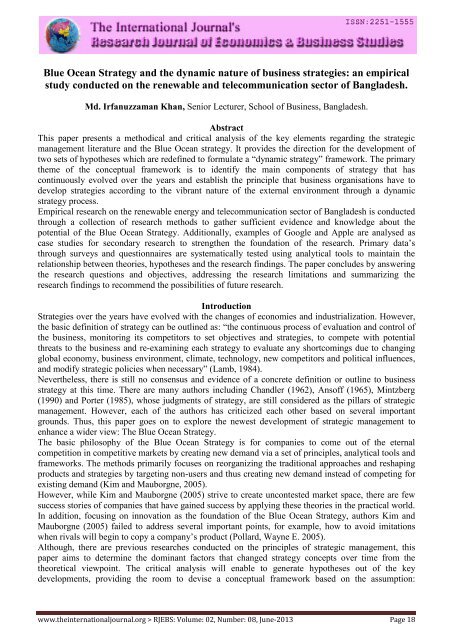Research Journal of Economics & Business Studies - RJEBS - The ...
Research Journal of Economics & Business Studies - RJEBS - The ...
Research Journal of Economics & Business Studies - RJEBS - The ...
- No tags were found...
Create successful ePaper yourself
Turn your PDF publications into a flip-book with our unique Google optimized e-Paper software.
Blue Ocean Strategy and the dynamic nature <strong>of</strong> business strategies: an empirical<br />
study conducted on the renewable and telecommunication sector <strong>of</strong> Bangladesh.<br />
Md. Irfanuzzaman Khan, Senior Lecturer, School <strong>of</strong> <strong>Business</strong>, Bangladesh.<br />
Abstract<br />
This paper presents a methodical and critical analysis <strong>of</strong> the key elements regarding the strategic<br />
management literature and the Blue Ocean strategy. It provides the direction for the development <strong>of</strong><br />
two sets <strong>of</strong> hypotheses which are redefined to formulate a “dynamic strategy” framework. <strong>The</strong> primary<br />
theme <strong>of</strong> the conceptual framework is to identify the main components <strong>of</strong> strategy that has<br />
continuously evolved over the years and establish the principle that business organisations have to<br />
develop strategies according to the vibrant nature <strong>of</strong> the external environment through a dynamic<br />
strategy process.<br />
Empirical research on the renewable energy and telecommunication sector <strong>of</strong> Bangladesh is conducted<br />
through a collection <strong>of</strong> research methods to gather sufficient evidence and knowledge about the<br />
potential <strong>of</strong> the Blue Ocean Strategy. Additionally, examples <strong>of</strong> Google and Apple are analysed as<br />
case studies for secondary research to strengthen the foundation <strong>of</strong> the research. Primary data’s<br />
through surveys and questionnaires are systematically tested using analytical tools to maintain the<br />
relationship between theories, hypotheses and the research findings. <strong>The</strong> paper concludes by answering<br />
the research questions and objectives, addressing the research limitations and summarizing the<br />
research findings to recommend the possibilities <strong>of</strong> future research.<br />
Introduction<br />
Strategies over the years have evolved with the changes <strong>of</strong> economies and industrialization. However,<br />
the basic definition <strong>of</strong> strategy can be outlined as: “the continuous process <strong>of</strong> evaluation and control <strong>of</strong><br />
the business, monitoring its competitors to set objectives and strategies, to compete with potential<br />
threats to the business and re-examining each strategy to evaluate any shortcomings due to changing<br />
global economy, business environment, climate, technology, new competitors and political influences,<br />
and modify strategic policies when necessary” (Lamb, 1984).<br />
Nevertheless, there is still no consensus and evidence <strong>of</strong> a concrete definition or outline to business<br />
strategy at this time. <strong>The</strong>re are many authors including Chandler (1962), Ans<strong>of</strong>f (1965), Mintzberg<br />
(1990) and Porter (1985), whose judgments <strong>of</strong> strategy, are still considered as the pillars <strong>of</strong> strategic<br />
management. However, each <strong>of</strong> the authors has criticized each other based on several important<br />
grounds. Thus, this paper goes on to explore the newest development <strong>of</strong> strategic management to<br />
enhance a wider view: <strong>The</strong> Blue Ocean Strategy.<br />
<strong>The</strong> basic philosophy <strong>of</strong> the Blue Ocean Strategy is for companies to come out <strong>of</strong> the eternal<br />
competition in competitive markets by creating new demand via a set <strong>of</strong> principles, analytical tools and<br />
frameworks. <strong>The</strong> methods primarily focuses on reorganizing the traditional approaches and reshaping<br />
products and strategies by targeting non-users and thus creating new demand instead <strong>of</strong> competing for<br />
existing demand (Kim and Mauborgne, 2005).<br />
However, while Kim and Mauborgne (2005) strive to create uncontested market space, there are few<br />
success stories <strong>of</strong> companies that have gained success by applying these theories in the practical world.<br />
In addition, focusing on innovation as the foundation <strong>of</strong> the Blue Ocean Strategy, authors Kim and<br />
Mauborgne (2005) failed to address several important points, for example, how to avoid imitations<br />
when rivals will begin to copy a company’s product (Pollard, Wayne E. 2005).<br />
Although, there are previous researches conducted on the principles <strong>of</strong> strategic management, this<br />
paper aims to determine the dominant factors that changed strategy concepts over time from the<br />
theoretical viewpoint. <strong>The</strong> critical analysis will enable to generate hypotheses out <strong>of</strong> the key<br />
developments, providing the room to devise a conceptual framework based on the assumption:<br />
www.theinternationaljournal.org > <strong>RJEBS</strong>: Volume: 02, Number: 08, June-2013 Page 18

















